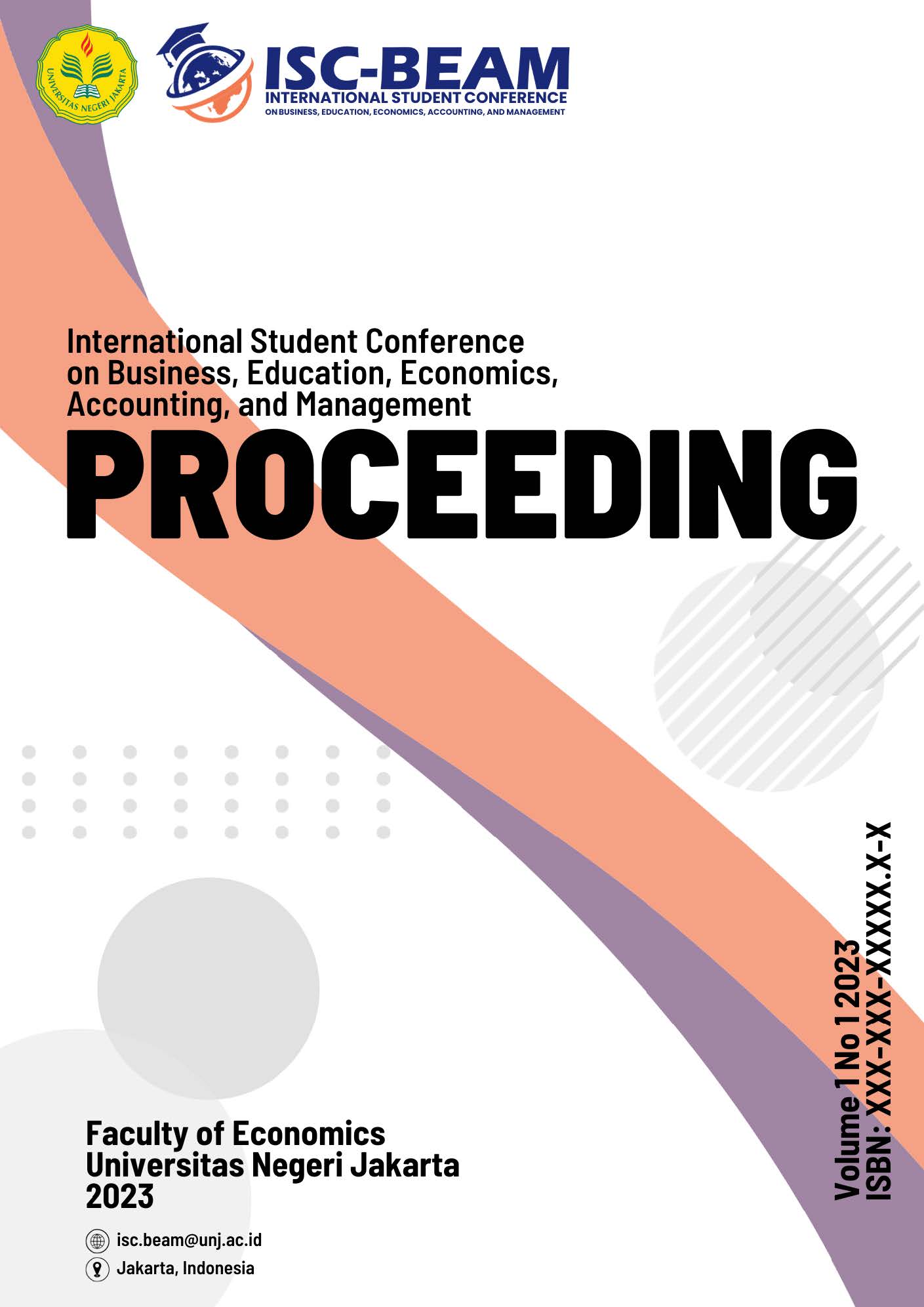Unraveling the Interplay between Financial Knowledge and FOMO in Shaping Adolescent Consumptive Behavior in Jakarta
DOI:
https://doi.org/10.21009/ISC-BEAM.011.02Keywords:
Financial Knowledge, Fear of Missing Out, Consumer BehaviorAbstract
This study seeks to investigate the impact of two variables, namely financial knowledge and the Fear of Missing Out (FOMO), on the behavior of teenagers in Jakarta as consumers. Financial knowledge and FOMO are considered as exogenous variables, while consumer behavior is treated as the endogenous variable. A total of 160 samples were utilized for this research, employing purposive sampling as the data collection technique. The analysis method employed was the Partial Least Square - Structural Equation Model (PLS-SEM). The data analysis for the outer model involved validity and reliability testing, while for the inner model, various techniques such as the coefficient of determination (R-Squares), multicollinearity test, and hypothesis testing were utilized. The findings indicate a significant positive impact of both financial knowledge and FOMO on consumer behavior. Additionally, it was observed that financial knowledge has a notable positive effect on the Fear of Missing Out (FOMO).
References
Chen, H., & Volpe, R. P. (1998). An Analysis of Personal Financial Literacy among College Students. 7(2), 107–128.
Darim, A. (2020). Manajemen Perilaku Organisasi Dalam Mewujudkan Sumber Daya Manusia yang Kompeten. In Jurnal Manajemen Pendidikan Islam E-ISSN: On Process (Vol. 1).
Gupta, M., & Sharma, A. (2021). Fear of Missing Out: A Brief Overview of Origin, Theoretical Underpinnings and Relationship with Mental Health. World Journal Of Clinical Cases, 9(19), 4881–4889. Https://Doi.Org/10.12998/Wjcc.V9.I19.4881
Hafsyah, A. H., & Artikel, H. (N.D.). Pengaruh Kepuasan Konsumen, Perilaku Konsumtif, dan Gaya Hidup Hedonis terhadap Transaksi Online(E-Commerce). Https://Ojs.Stiesa.Ac.Id/Index.Php/
PrismaHerdjiono, I., & Damanik, A. (N.D.). Pengaruh Financial Attitude, Financial Knowledge , Parental Income terhadap Financial Management Behaviour.
Indrabayu, A., & Destiwati, R. (2022). The Influence of Intrapersonal Communication and Fear of Missing Out on Hedonism in Generation Z in Denpasar. In Management Studies and Entrepreneurship Journal (Vol. 3, Issue 4). Http://Journal.Yrpipku.Com/Index.Php/Msej
Islami, Z. (2020). Pengaruh Fear Of Missing Out, Kontrol Diri, Narsisme, dan Strategi Koping terhadap Adiksi Media Sosial pada Mahasiswa di Jabodetabek.
Joseph F. Hair Jr., G. Tomas M. Hult, Christian M. Ringle, Marko Sarstedt, Nicholas P. Danks, & Soumya Ray. (2021). Classroom Companion: Business Partial Least Squares Structural Equation Modeling (Pls-Sem) Using R Aaworkbook. Http://Www.Pramedi, & Asandimitra. (2021). 13154-Article Text-45257-1-10-20210630. Ilmu Manajemen, 9(2). Https://Journal.Unesa.Ac.Id/Index.Php/Jim/Article/View/13154/Pdf
Ristati, Zulham, & Sutriani. (2022). 11524-27872-1-Pb. Jurnal Ekonomi dan Manajemen, 19(3), 576–589.Rozaini, N., & Sitohang, A. (2020). Pengaruh Pengelolaan Uang Saku dan Modernitas terhadap Perilaku Konsumtif Mahasiswa Program Studi Pendidikan Ekonomi Fakultas Ekonomi Universitas Negeri Medan Stambuk 2018. Jurnal Manajemen Bisnis Eka Prasetya (Jmbep), 6(2), 1–8
.Sugiyono. (2013). Metode Penelitian Kuantitatif.Sumartono, & Djabar, H. B. (2002). Terperangkap dalam Iklan: Meneropong Imbas Pesan Iklan Televisi. Alfabeta. Https://Books.Google.Co.Id/Books?Id=H9mvnaaacaaj
Tribuana, L. (2020). Pengaruh Literasi Keuangan, Pengendalian Diri dan Konformitas Hedonis terhadap Perilaku Konsumtif Mahasiswa. Https://Ojs.Stiesa.Ac.Id/Index.Php/Prisma
Xiao, J. J., & O’neill, B. (2016). Consumer Financial Education and Financial Capability. International Journal Of Consumer Studies, 40(6), 712–721. Https://Doi.Org/10.1111/Ijcs.12285






